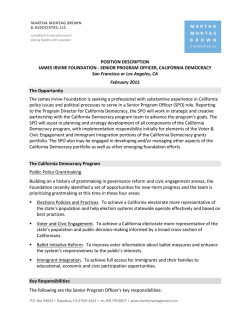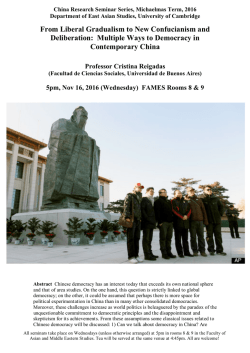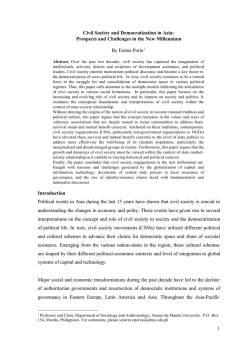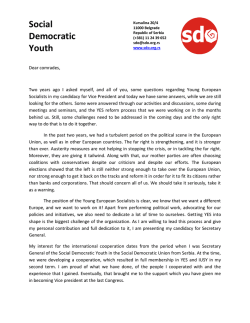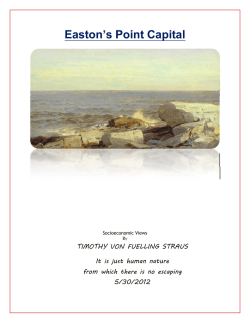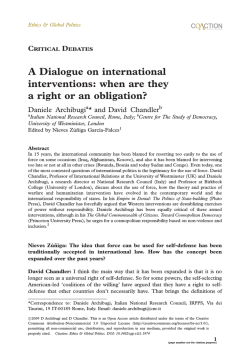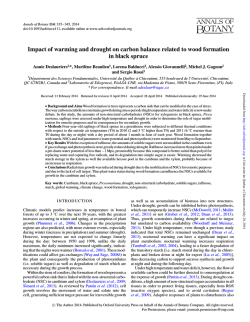
Download - Daniele Archibugi
TI-IE EUROPEAN UNION REVIEW, VOL. 10 No. 1 2005 Notes on Democracy in the European Union DANIELE ARCHIBUGI* Résumé. On soutient souvent que les institutions de l'Union Européenne ne seraient pas suffisamment démocratiques et qu 'une intégration plus poussée risquerait d 'augmenter ce déficit démocratique. Toutefois, il serait peut-étre mieux de se poser une contre-question: quel serait le taux de démocratie existant dans chaque Etat Membre de l'Union Européenne en l'absence des institutions communautaires? Le projet européen a été un véhicule formidable de démocratie qu'il a consolidé au Sud aussi bien qu'au Nord du continent tout en augmentant graduellement la représentativité, la transparence et la participation dans les institutions communautaires. 1. Premise For somebody committed to global democracy, the European experiment has a rather different flavour than for anybody who works with democracy at the state level. The latter will naturally compare the European polity with national models, and this will show the many imperfections of the EU. The former, on the contrary, will note that there is no international organisation so sophisticated as the EU and they will be more than satisfied if in the next quarter of a century the United Nations, the International Monetary Fund, the World Trade Organisation or any other international organisation, will introduce a small fraction of the devices which currently guarantee transparency, participation and accountability in the EU. In other words, for those working on global democracy, the EU is an invaluable model, while for those working on state democracy the EU continues to be an anomaly. * Italian National Research Council, Italy A preliminary version of this paper was prepared for the Conference "Accountability and Representation in European Democracy", held at the Minda de Gunzburg Center for European Studies, Harvard University, May 2-3 2003. I wish to thank Peter Hall, Mathias Koenig-Archibugi, Jane Mansbridge, Andrew Moravicsik and Glyn Morgan for their comments. THE EuROPEAN UNION REVIEW, VOL. 10 No. 1 2005 I do not think that these different perspectives can or should be reconciled. On the contrary, I maintain there is something vital in them. The fact that students of democracy are comparing the EU against the standards of a state system has been, and it will continue to be, a driving force to reach a more democratic EU. In turn, the existence of the EU is the most important prove that some of the principles and procedures of democracy can also be applied beyond the nation-state. The EU case, even more than the Indian one, militates against the thesis that "democratic politics is politics in the vernacular" I . Or, at least, it demonstrates that it is wrong to assume that a meta-vernacular democracy is impossible. Within this outline, I stress four points. The first is that the widely debated issue of the European democratic deficit needs to be assessed against the deficit that it would occur in absence of EU institutions. The second concerns a paradox about the European demos, which appears to be (occasionally) vibrant in areas where there is no specific EU institutional activity, whilst it proves much more apathetic in areas where EU regulations and competencies are significant. The third argues that a greater accountability in the regulatory activity is both possible and desirable. Lastly, I note that the integration process has gone on at a significant pace, and that this should not pass unnoticed. 2. On the Democratic Deficit Groucho Marx once said: "I don't want to belong to any club that will accept me as a member". Groucho was anticipating what became one of the most frequent criticisms of the European Union: "if the EU were to apply for membership in the EU, it would not qualify because of the inadequate democratic content of its constitution" 2 . A large literature has discussed the nature of the EU democratic deficit 3. It has been argued that the procedures are not transparent W. KYMLICKA, Politics in the Vernacular, Oxford University Press, Oxford, 2001, p. 121. z See for example M. ZuRN, "Democratic Governance Beyond the Nation-state: The EU and Other International Institutions", in European Journal of International Relations, Vol. 6, no. 2, 2000, p. 183. For a range of views, see: R. BELLAMY and D. CASTIGLIONE, The Uses of Democracy. Further Reflections on the Democratic Deficit in Europe, in E.O. 76 DEMOCRACY IN THE EU (especially for the Commission), that the principal governing body (the Council) is not directiy accountable to European citizenry, and that the powers of the Parliament are limited. It is sometimes stated that these critiques go against the project of European integration. Contrarily to this I argue that they are benevolent to this project since they are made in order to democratise further European institutions. Those who mention a "democratic deficit" imply, first, that a democratic system is possible, and, second, that ways to compensate it should be sought. The notion has therefore served the purpose to increase transparency, participation and accountability in the Union or, at least, to write the issue down in the agenda. Euro-sceptics never used the term "democratic deficit" but, more openiy the lack, or even the impossibility or undesirability, of anything like a European democracy. It has passed unnoticed that, so far, the (partial) lack of democracy in Europe has been assessed vis-à-vis the existing institutions. An equally interesting exercise would be assessing the gap in democracy in absence of these institutions. The social and economic interconnections within the European space are so thick that individuai European states have a limited degree of autonomy in their decisions. There is a European integration that has started long before a formai body of European institutions were designed and implemented. Some historians have argued that the need to put together coal and iron, badly split across the French-German border, was one of the reasons behind World Wars I and II. Theses like this are difficult to falsify, but it is certainly significant that one of the first areas of formai integration was coal and steel. The ancient CECA was certainly insufficiently democratic, but the previous forms of settling "negotiations" were certainly less satisfactory. Deliberations taken by self-governing political communities have anyhow to face an external environment. In many cases, these deliberations would be irrelevant unless they are consistent with external and J.E. FossuM (eds.), Integration Through Deliberation? On the Prospects for European Democracy, University of City London Press, London, 2000; M.Th. GREVEN and L.W. PAULY (eds.), Democracy Beyond the State? The European Dilemma and the Emerging Global Order, Rowan & Littlefield, Lanham, ERIKSEN 2000; A. MORAVICSIK, "In Defence of the Democratic Deficit: Reassessing Legitimacy in the European Union " , in Journal of Common Market Studies, Vol. 40, no. 4, 2002, pp. 603-624; T. POGGE, "Creating Supra-national Institutions Democratically: Reflection on the European Union's Democratic Deficit", in Journal of Political Philosophy, Vol. 5, no. 2, 1997, pp. 163-182. 77 THE EUROPEAN UNION REVIEW, VOL. 10 No. 1 2005 constrains. For example, any polity can democratically deliberate to ban SARS, but this does not mean that it will manage to hit the target. Even less can be achieved if there is no co-ordination between neighbouring polities. In matters such as trade, environment, immigration, currency and many others, individuai political communities are so strictly interconnected that the Jack of common, although imperfect, institutions would increase the probability that economic and social life is shaped by decisions taken elsewhere. Consider the case of Switzerland, a self-governing polity that has never joined the European Union. In which domains have the Swiss a greater level of autonomy than, say, the Austrians? Are the Swiss better protected than the Austrians from, say, pollution or epidemics? Even in cruciai areas that apparently are manageable at the state level, a polity has to face the impact of decisions taken elsewhere. In trade, environment and even currency the Swiss polity cannot ignore external constrains. Although Austria is a small country and its political weight in the EU decision-making is limited, it has, at least, the advantage to be part of a common deliberative process and it can use the various European institutions – the Council, the Parliament, the Commission, the Court – to defend its interests and values against pollution as well as against unfair trade. The monetary union is often cited as the most typical case of "democratic deficit". Lets compare three small and neighbouring countries such as Norway, Sweden and Finland. The former has not joined the EU, the second has joined the EU but not the monetary union, and the third has joined both the EU and the monetary union. It might apparently seem that the Norwegian citizens have a greater degree of autonomy over monetary policy. In fact, their government can decide to increase currency supply, while the Finn government cannot. But if we look at other crucial economic policy indicators, such as the rate of interest and the rate of exchange, it emerges that Norway has not a greater autonomy than Finland, and even the management of currency supply would have short, if any, economic impact. On the contrary, any fluctuation of the Euro will directly affect the Norwegian economy as much as European countries, although the Norwegian polity will not have any direct participation in the political process. Overall, Norway seems financially more fragile than Finland. Sweden has faced severe currency devaluation as a result of not joining the Euro. It is not sufficient to cherish the desire of autonomy; policies need to be consistent and effective for its reach. In the contemporary landscape, integration is a necessity as much as a choice. 78 DEMOCRACY uv THE EU A significant comparison can also be made with NAFTA, a regional organisation that, so far, has not made any attempt to introduce any democratic procedure. Is there a greater self-determination in trade choices than in the European Union? It might be argued that this is the case for the strongest member of the Agreement (the United States), but certainly not for Mexico and Canada. Clarkson has even suggested that the democratic deficit of Mexico and Canada are balanced by a "democratic" surplus of the United States 4. The proposed exercise to compare the level of democracy within the EU also against the level of democracy in absence of the EU will probably indicate that we are far from having achieved an ideal level of democracy. But, at the same, time, it would also show that the EU has increased, not decreased, democratisation in the old continent. The European Union could certainly be more democratic, and the notion of democratic deficit helps to reach this goal. But less EU is likely to reduce the possibility of average European citizens to fulfil their desired preferences. 3. In Search of the European Demos Certainly, there is not a European demos at the same extent to which we have a French, a Swedish or even an American demos. The European polity continues to resemble Babylon after Nimrod's challenge: there are already 20 official languages in the European Parliament, and soon they will be more. But this does not necessarily imply that a super-national institution like the European Union should give up any desire to apply some principles and procedures of democracy. A European public opinion has so far kept rather distant from the main activities carried out by the institutions of the EU. The areas in which the EU has shown its teeth - such as trade, competition, monetary policy, regional development, re-training of the workforce, and even agricultural policy – have been of very little interest to European public opinion. While specific lobbies, such as the agricultural one, have been very active, the generai public is hardly informed about the powers at 4 S. CLARKSON, Do Deficits Imply Surpluses? Towards a Democratic Audit of North America, in M.Th. GREVEN and L.W. PAULY (eds.), Democracy Beyond the State? The European Dilemma and the Emerging Global Order, Rowan & Littlefield, Lanham, 2000. 79 THE EUROPEAN UNION REVIEW, VOL. IO No. 1 2005 disposal of the Commission. The European lobbies work effectively and efficiently at the national as well as at the European level, and have been rapid to re-organize their focus groups from the national to the continental context. They have been the first to hire office-space in Brussels when this was functional to the protection of their own interests. These lobbies, however, have not warmed up the heart of the generai European public. 4. The European Public Opinion That is, concern, open debate and even joint public action for issues of continental-wide scope — has often be vital for questiona where the European institutions have little or no competence. A genuine European concern emerged already in 1986 after the Chernobyl disaster. In the 1980s, significant public actions were taken against the deployment of Euro-missiles. In 1989, all European participated to the joy for the fall of the Berlin Wall. On February 15 2003 we assisted to co-ordinated public actions against the war to Iraq in all European countries, with an estimated participation of about 4-5 per cent of the European demos. In all these occasions, an intensive open debate occurred. Key politicians, intellectuals and commentators had an authentic European forum, and their positions reported in all European media. A common public opinion in Europe emerges for ideological and humanitarian purposes rather than for the defence of interests specific to EU policies. The heart, more than the wallet, is driving the European demos. In generai terms, a European public opinion is manifesting itself in fields that are far away from what the institutions of the European Union can do and actually do. It is much easier to organise a European campaign against the death penalty or the whale fishing than for a different monetary policy of the European Centrai Bank. The political expression of this "demos" has three characteristics: 1. It is volatile over time. It might be very active over a short period, but it dissolves itself after the public action. It is as quick to appear as to disappear. 2. It is rather difficult to assess what is its real political weight. Even in clamorous cases, the most significant one being the 15 of February 2003, the lack of explicit institutional channels does not allow to state that the majority of European citizens were against the war. 3. The lack of a direct European interface makes these mobilisations relevant for policy-making at the national level. 80 DEMOCRACY IN THE EU European institutions are facing an anaemic public opinion when they have to deliberate on their own mandate. But a vibrant public opinion is facing no European institutional context. Can this divide continue forever? The strengthening of the European Union in areas such as foreign and security policy might in the long run bridge this gap 5 . But this implies a major challenge for Europe. So far, we have to accept the fact that the European demos seems quite happy to delegate a substantial amount of regulatory activity to non-elected and not easily accountable EU institutions. It is often argued that bureaucratic elites prefer to devolve functions to supra-national institutions since this increases the autonomy of governments and lowers the accountability vis-à-vis national parliaments and public opinion6. In other words, creating binding external agreements through international organisations helps groups in power to avoid internai checks and negotiations. Cases of the like are typical in the EU: almost all national governments contain requests of specific lobbies (and potential electors) invoking external constraints. When peasants ask greater subsidies, public utility managers seek monopolistic privileges or public servants demand increased salaries, national governments evoke their impossibility to satisfy these requirements because of EU constrains. The EU competition policy and the Maastricht parameters have therefore been hypocritically used by national governments to deny what they were not prepared to concede. It is not a surprise that to use the EU as a fig leaf to deny specific lobbies the object of their desire has not increase its popularity. But I think that it is excessive to argue that governmental elites have chosen European integration just because they wanted to avoid internal control or, more simply, internal confiicts. I am not arguing that European governments are composed by long-sight altruistic politicians, but in more than one occasion integration policies have been dictated by the need to survive in an international context where individuai states where too small to have any significant role in world politics. I can take the example of joining the monetary union in my own country. The Bank of Italy supported consistently and unanimously – from the Governor to the last porter – the choice to join the Euro in spite of the fact that this would have led the institution to loose its most important function. 5 M. KOENIG-ARCHIBUGI, "The Democratic Deficit of EU Foreign and Security Policy", in The International Spectator, no. 4, 2002, pp. 61-73. 6 K.D. WOLF, "The New Raison d'Etat as a Problem for Democracy in World Society", in European Journal of International Relations, Vol. 5, no. 4, 1999, pp. 333-363. 81 THE EUROPEAN UNION REVIEW, VOL. 10 No. 1 2005 5. Regulation and Democracy Many commentators, including Majone and Moravcsik, have argued that the core of EU activities consists of regulations that do not require a direct involvement of the demos 7 . Competition policy, trade regulation and science policy are not under the scrutiny of popular control within individuai states and even less there is the need to put them under the control of the European population. The argument can be extended even to monetary policy: long before the European Central Bank was created the national demoi were kept away from having a direct power over the value of the currency in many European countries. Central banks developed an early concern to protect the value of money – and therefore the interests of money-holders rather than those of citizens. I do not think, however, that the problem of a greater accountability on European Union's policies can be ignored. First, it cannot be ignored that this is an area of popular concern. Many organised groups, especially in small and highly democratic polities, complain about the Jack of direct involvement in the EU decision-making. Issues such as the ban of small-sized red apples irritated the Danish public, and the verdict against the English greengrocer Steven Thorburn (soon to become the metric martyr) made the EU look . like an Orwellian monster. These issues should be addressed and I believe that it will be helpful if European institutions will find appropriate democratic devices that can sort them. Hasty regulatory decisions carried out by Eurocrats, often on irrelevant issues that do not affect at all the overall EU integration process, have damaged the European project more than major political scandals. These problems can easily be overcome with innovative machinery, for example by using stakeholders or even random samples of European citizens to validate certain decisions. I do not think that this should be considered a lip service to avoid an increasing number of "metric martyrs", but as an important step to improve the outcome of regulatory decision-making. In too many aspects of economic and social life, regulations dictated by Brussels occur in a vacuum, in air-conditioned rooms remote from the rea) life, and with little capacity of the pertinent G. MAJONE (ed.), MORAVICSIK, op. Cit. 82 Regulating Europe, Routledge, London, 1996, and A. DEMOCRACY IN THE EU politicians to steer what is actually occurring. A greater participation of stakeholder can help to avoid taking decisions that are not needed. Last but not least, the EU is not only about regulating economic and social activities. Although so far this has been the bulk of the European concern, it is very likely that in the future the EU will expand its influences to areas of redistribution and foreign policy and security. It is unlikely that any policy in these areas can be made without a greater participation of European citizenry. 6. "Eppur si muove!" The heated debate about the nature of the European Union has not stopped the progress of the. integration in Europe. Although with different speeds, all over the last 45 years, Europe has continued to: – Widen geographically. The six original countries have already become 25 (plus East Germany). The centripeta) force of the EU has been so strong that would-be-member countries (e.g. Turkey) come from other continents and cultura) and religious backgrounds. – Increased its competences. Although with a different level of competence and power, the European project started from very limited areas (atomic energy, steel and coal). Today, there is basically no political aspect of member states that is entirely independent from European institutions. Deepening its integration. The significance of European regulation and instruments has slowly but consistently increased. What was originally an inter-governmental organisation has more and more produced institutions to respect the rule of law (the Court) and the popular accountability (the Parliament). The Commission has constantly increased its size, budget and competences. For an "unidentified political object" these seems to be three major achievements 8 . According to polls, European citizens (especially in Southern European countries) are quite happy about the progresses of the experiment, and rightly so. 8 P.C. SCH ITFER, How to Democratize the European Union — and Why Bother?, Chapter I, Rowan & Littlefield, Lanham, 2000. 83 THE EUROPEAN UNION REVIEW, VOL. 10 No. 1 2005 Not necessarily the three componente lead to democratisation. Enlargement (first and foremost to the United Kingdom!) has made the deepening more difficult and it has represented in more than one occasion an obstacle to democratisation within the Union. Enlargement to Greece, Spain and Portugal has had a fundamental impact in stabilising the political regime in these countries, although it has somehow slowed down European integration. Something similar is expected to happen with the inclusion of the new members from Eastern Europe. Increasing the competences to foreign and even security policies would make much more sensitive the accountability of European officers to the public and national governments. In spite of Euro-sceptics (which continue to agglomerate in England), one of the remarkable facts about the EU is that none of the steps towards a greater integration has been reversed. The notable exceptions are the double decision of the Norwegian electorate to abandon the European Economic Community in 1972 and in 1994, and of the Swedish and Danish electorates of not joining the Euro. It is often discussed if the European integration can continue with the existing incrementai steps or if a major "Madisonian" great step forward is needed. This debate is hiding that some major great step forwards have already taken piace in the recent past (i.e. the Euro and the inclusion of the new members in a relatively short period). More active polices are desirable and they should now be attempted. But certainly, the scepticism on the European project seems, at least, premature. The European revolution has been so silent that some have not even heard it. 7. Prospects for Europe Will and shall Europe evolve into a Federal system? This issue – as ancient as debated – has recently taken a new shape. Internally, it does not seem that Europeans need a major change from the old and effective strategy of small incrementa) steps. Massive mobilisations to reach a further centralisation are not likely to occur in the future as they have not occurred in the past. The internai issues that Europeans would like to discuss and deliberate at the EU level are already well served. More than to promote a further deepening, the most urgent priority today is to accommodate a substantial number of new members. But the international landscape has dramatically changed since the Treaty of Rome. The danger of Soviet domination is over. The military 84 DEMOCRACY IN THE EU shelter of the United States has become less and less friendly. After the end of the Pact of Warsaw, the Untied States have become a factor of division rather than cohesion for Europe. Europe has been marginalized and in some occasions even humiliated in world politics. Contrary to many expectations, any further progress in European integration will not be directed by internal interests, but by the fear to become irrelevant on the world scene 9. Certainly, Hamilton, Madison and Jay would not be surprised to see that the federai way opens its gates when a potential adversary is ahead. But they might be a bit baffled to understand why George W. Bush Jr. did much more than any other European politician to induce the Old Continent to a greater unity. G. MORGAN, The Idea of a European Superstate. Public Justification and European Integration, Princeton University Press, Princeton, 2005. 85 THE EUROPEAN UNION REVIEW, VOL. 10 No. 1 2005 References BEETHAM D. and C. Lou, Legitimacy and the European Union, Longman, London, 1998. BELLAMY R. and D. CASTIGLIONE, The Uses of Democracy. Further Reflections on the Democratic Deficit in Europe, in E.O. ERIKSEN and J.E. FossuM (eds.), Integration Through Deliberation? On the Prospects for European Democracy, University of City London Press, London, 2000. CLARKSON S., Do Deficits Imply Surpluses? Towards a Democratic Audit of North America, in M.Th. GREVEN and L.W. PAULY (eds.), Democracy Beyond the State? The European Dilemma and the Emerging Global Order, Rowan & Littlefield, Lanham, 2000. ERIKSEN E.O. and J.E. FOSSUM (eds.), Integration Through Deliberation? On the Prospects for European Democracy, University of City London Press, London, 2000. FRANKLiN M., P. HALL, G. MORGAN and C. SKACH, Accountability and Representation in European Democracy, Cambridge, MA, Conference Proposal, 2003. GREVEN M.Th. and L.W. PAULY (eds.), Democracy Beyond the State? The European Dilemma and the Emerging Global Order, Rowan & Littlefield, Lanham, 2000. KYMLICKA W., Politics in the Vernacular, Oxford University Press, Oxford, 2001. KOENIG-ARCHIBUGI M., "The Democratic Deficit of EU Foreign and Security Policy", in The International Spectator, no. 4, 2002, pp. 61-73. MAJONE G. (ed.), Regulating Europe, Routledge, London, 1996. MoRAVICSIK A., "In Defence of the Democratic Deficit: Reassessing Legitimacy in the European Union", in Journal of Common Market Studies, Vol. 40, no. 4, 2002, pp. 603-624. MORGAN G., The Idea of a European Superstate. Public Justification and European Integration, Princeton University Press, Princeton, 2005. POGGE T., "Creating Supra-national Institutions Democratically: Reflection on the European Union's Democratic Deficit", in Journal of Political Philosophy, Vol. 5, no. 2, 1997, pp. 163-182. SCHMITI'ER P.C., How to Democratize the European Union – and Why Bother? Rowan & Littlefield, Lanham, 2000. WOLF K.D., "The New Raison d'Etat as a Problem for Democracy in World Society", in European Journal of International Relations, Vol. 5, no. 4, 1999, pp. 333-363. ZURN M., "Democratic Governance Beyond the Nation-state: The EU and Other International Institutions", in European Journal of International Relations, Vol. 6, no. 2, 2000, pp. 183-221. 86
© Copyright 2026
